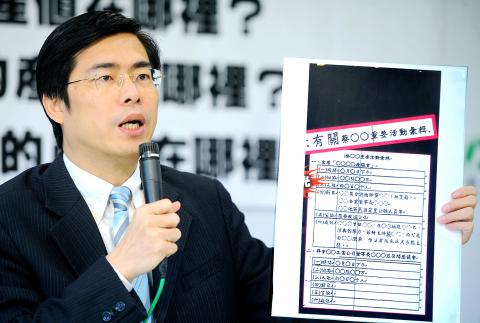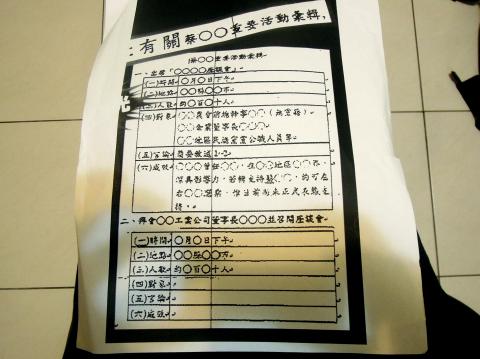The Democratic Progressive Party (DPP) yesterday condemned the intelligence authorities after allegations that they had been monitoring the party’s presidential candidate, Tsai Ing-wen (蔡英文), saying President Ma Ying-jeou (馬英九) should offer a clear explanation.
The Chinese-language Next Magazine yesterday reported that National Security Council (NSC) Secretary-General Hu Wei-chen (胡為真) had acted beyond his authority when he allegedly asked the Ministry of Justice’s Investigation Bureau to monitor Tsai in May.
Since Hu directly reports to Ma, who is seeking re-election as the Chinese Nationalist Party (KMT) candidate, Ma should explain whether he was aware of the illegal practice, Tsai said at a campaign stop in Kinmen.

Photo: Wang Min-wei, Taipei Times
“The President of the [Republic of China] ROC exploited government agencies to collect information to benefit his election campaign ... He is apparently capitalizing on the state apparatus for his own benefit and will have to be held accountable,” Tsai said.
At a press conference in Taipei, DPP spokesperson Chen Chi-mai (陳其邁) described the alleged practice as “Taiwan’s Watergate scandal,” as a president who is seeking re-election was suspected of abusing his power and ordering the intelligence authorities to monitor his opponents to benefit his election campaign.
According to the Next Magazine report, Weng Shih-tsan (翁詩燦), director of the NSC’s Secretariat, attended an intelligence meeting organized by the Investigation Bureau last week and took away information related to the presidential election, before submitting the information to Ma via Hu.

Photo: Lin Shu-hui, Taipei Times
The magazine’s report named 28 senior agents at the bureau, who it said were given the task of monitoring Tsai and submitting weekly reports on the times, locations and the attendees at Tsai’s campaign events.
The magazine said agents also made evaluations on the influence of local politicians or businesspeople who met with Tsai — KMT members and non-partisan representatives in particular — and predicted how many votes were at stake if they offered their support to Tsai.
It also cited an unidentified high-ranking official at the National Security Bureau (NSB) as saying that the NSC and Hu had ignored the intelligence system’s chain of command.
In response to the report, the NSC said that while it did send Weng to the meeting, he did not take any information away and no information had been submitted to Hu and Ma.
The NSB said in a press release that the NSC did not breach the chain of command.
The Investigation Bureau also denied the report. It said in a press release that it is one of the agencies responsible for the security of the presidential and vice presidential candidates, so naturally it knows about the candidates’ campaign activities. However, it said it does not get involved in the election, adding that while it analyzes and responds to the security situation, it does not offer the Presidential Office or the NSC candidates’ campaign information.
At a separate press conference, the DPP caucus criticized the alleged illegal monitoring.
On Dec. 23, 2008, Ma urged the Investigation Bureau’s agents to pledge loyalty to the country, the Constitution and the people, rather than the president or their superiors, DPP Legislator Lin Shu-fen (林淑芬) said.
Ma also said during a presentation last week that he would withdraw from the election if he “had resorted to the state apparatus for political oppression of his opponents,” Lin added.
Lin said she wondered whether Ma dared to make the same pledge again now that it was clear that the NSC, which is in charge of formulation and coordination of national security and defense policy, has become an agency that collects domestic election information.
When approached by reporters during a visit to a market in Greater Taichung, Ma said he had no knowledge about Tsai’s campaign schedule and he simply said “no” when asked whether he had instructed the NSC to collect information on Tsai.
Additional reporting by Rich Chang and Mo Yan-chih

CHAOS: Iranians took to the streets playing celebratory music after reports of Khamenei’s death on Saturday, while mourners also gathered in Tehran yesterday Iranian Supreme Leader Ayatollah Ali Khamenei was killed in a major attack on Iran launched by Israel and the US, throwing the future of the Islamic republic into doubt and raising the risk of regional instability. Iranian state television and the state-run IRNA news agency announced the 86-year-old’s death early yesterday. US President Donald Trump said it gave Iranians their “greatest chance” to “take back” their country. The announcements came after a joint US and Israeli aerial bombardment that targeted Iranian military and governmental sites. Trump said the “heavy and pinpoint bombing” would continue through the week or as long

TRUST: The KMT said it respected the US’ timing and considerations, and hoped it would continue to honor its commitments to helping Taiwan bolster its defenses and deterrence US President Donald Trump is delaying a multibillion-dollar arms sale to Taiwan to ensure his visit to Beijing is successful, a New York Times report said. The weapons sales package has stalled in the US Department of State, the report said, citing US officials it did not identify. The White House has told agencies not to push forward ahead of Trump’s meeting with Chinese President Xi Jinping (習近平), it said. The two last month held a phone call to discuss trade and geopolitical flashpoints ahead of the summit. Xi raised the Taiwan issue and urged the US to handle arms sales to

BIG SPENDERS: Foreign investors bought the most Taiwan equities since 2005, signaling confidence that an AI boom would continue to benefit chipmakers Taiwan Semiconductor Manufacturing Co’s (TSMC, 台積電) market capitalization swelled to US$2 trillion for the first time following a 4.25 percent rally in its American depositary receipts (ADR) overnight, putting the world’s biggest contract chipmaker sixth on the list of the world’s biggest companies by market capitalization, just behind Amazon.com Inc. The site CompaniesMarketcap.com ranked TSMC ahead of Saudi Aramco and Meta Platforms Inc. The Taiwanese company’s ADRs on Tuesday surged to US$385.75 on the New York Stock Exchange, as strong demand for artificial intelligence (AI) applications led to chip supply constraints and boost revenue growth to record-breaking levels. Each TSMC ADR represents

State-run CPC Corp, Taiwan (CPC, 台灣中油) yesterday said that it had confirmed on Saturday night with its liquefied natural gas (LNG) and crude oil suppliers that shipments are proceeding as scheduled and that domestic supplies remain unaffected. The CPC yesterday announced the gasoline and diesel prices will rise by NT$0.2 and NT$0.4 per liter, respectively, starting Monday, citing Middle East tensions and blizzards in the eastern United States. CPC also iterated it has been reducing the proportion of crude oil imports from the Middle East and diversifying its supply sources in the past few years in response to geopolitical risks, expanding